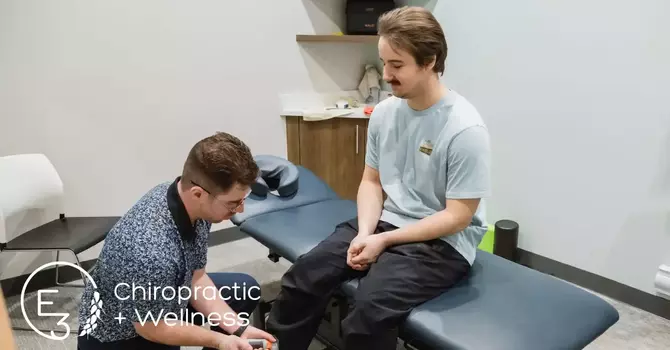
We’ve all had those mornings—you wake up, try to sit up in bed, and feel like the Tin Man before he got his oil can. Your back is tight, your neck is sore, and everything just feels...stuck. Morning stiffness is incredibly common, especially for active adults juggling work, workouts, and life. But here’s the thing: just because it’s common doesn’t mean it’s normal. If you’re waking up stiff more often than not, your body is trying to tell you something—and it’s time to listen.
At E3 Chiropractic + Wellness, we help active adults decode these kinds of signals every day. In this blog, we’ll break down what causes morning stiffness, what it means for your health, and—most importantly—what you can do to fix it.
What Is Morning Stiffness, Really?
Let’s start by defining what we mean. Morning stiffness refers to a sensation of tightness, reduced mobility, or discomfort in the joints or muscles after waking up. It might take a few minutes—or an hour—before you feel “warmed up” and back to normal. But if you’re constantly relying on coffee and movement just to feel human again, that’s a red flag.
Morning stiffness is most commonly felt in the:
- Neck
- Low back
- Hips
- Shoulders
Common Causes of Morning Stiffness
There isn’t a one-size-fits-all answer, but there are several common culprits we see frequently at our clinic.
1. Poor Sleeping Posture
Your sleeping position could be putting unnecessary stress on your joints. Sleeping on your stomach, for instance, forces your neck to rotate for hours, compressing joints and tightening muscles.
Fix it: Try sleeping on your back with a supportive pillow under your knees, or on your side with a pillow between your knees to keep your spine aligned.
2. Lack of Movement During Sleep
During the day, your joints are constantly lubricated by synovial fluid as you move. But when you're sleeping and still for hours, that fluid doesn’t circulate as effectively. This can cause the joints—especially in the spine—to feel stiff when you first get up.
Fix it: Light movement like stretching or foam rolling before bed can help stimulate circulation and reduce morning stiffness.
3. Chronic Inflammation
If you're dealing with ongoing joint stiffness that doesn’t ease up quickly in the morning, you could be dealing with low-grade inflammation from repetitive stress, overuse injuries, or underlying joint conditions.
Fix it: Inflammation requires a more targeted approach, including addressing biomechanics, reducing stress on the joints, and sometimes changing your workout routine. A visit to a Saskatoon Chiropractor like E3 Chiropractic + Wellness can help you identify the root cause.
4. Muscle Imbalances and Tightness
Many people unknowingly favor one side of their body or have muscular imbalances from daily activities, work posture, or sport-specific movements. Over time, these patterns create tightness and joint restrictions that show up as stiffness in the morning.
Fix it: Corrective exercises and manual therapy can restore balance and improve mobility.
5. Arthritis or Joint Degeneration
In some cases, morning stiffness is a sign of osteoarthritis or degenerative disc disease, particularly in adults over 40. These conditions reduce joint space and cartilage, leading to joint restriction and pain—especially after long periods of rest.
Fix it: Early intervention is key. Chiropractic care, mobility work, and strength training can slow progression and reduce symptoms.
What Morning Stiffness Says About Your Health
Here’s the truth: your body is designed to move well and without pain. If you’re consistently waking up stiff, it’s a signal that your movement system is under stress—whether from posture, injury, lack of recovery, or aging-related changes.
Ignoring morning stiffness won’t make it go away. In fact, it often gets worse over time, leading to:
- Increased injury risk during workouts or daily activities
- Compensations in other areas of the body
- Reduced performance and recovery
- Chronic pain patterns
Morning stiffness is your body whispering before it starts yelling. Catching and correcting the issue early is always better than waiting until you’re dealing with a full-blown injury.
How E3 Chiropractic + Wellness Can Help
At E3 Chiropractic + Wellness, we use a unique approach designed to help active adults not only eliminate pain but understand why it’s happening in the first place. Our care model includes:
- A Deep-Dive Assessment
We don’t just look at where it hurts—we look at how your entire body moves. Our detailed assessments identify joint restrictions, muscular imbalances, posture issues, and movement patterns that may be contributing to your stiffness.
- Hands-On Treatment
Using a combination of joint adjustments, soft tissue therapy, and functional rehab, we help restore motion, reduce pain, and reset faulty movement patterns.
- Strength & Mobility Programs
Once you're out of pain, we guide you through customized exercise programs to strengthen your body and build resilience. This helps keep stiffness and pain from returning.
- Ongoing Education
We believe you should be the expert on your own body. That’s why we take time to explain your condition and what you can do to prevent it in the future.
Whether your stiffness is mild and annoying, or starting to affect your workouts and sleep, we’re here to help you fix it before it turns into something bigger.
Daily Habits to Reduce Morning Stiffness
While seeing a professional is the best way to get to the root cause, here are a few strategies you can implement right away:
Stretch Before Bed
- Focus on gentle movements like child’s pose, spinal twists, or hip openers.
Improve Your Sleep Position
- Use supportive pillows and avoid stomach sleeping when possible.
Morning Mobility Routine
- Take five minutes after waking up to do light stretching or foam rolling. This helps ease your body into movement for the day.
Stay Hydrated
- Dehydrated muscles are more prone to stiffness. Drink plenty of water, especially after workouts.
Move More During the Day
- Long periods of sitting contribute to tight muscles and joint restriction. Set reminders to move every 30–60 minutes.
Final Thoughts
Morning stiffness may seem like a normal part of aging or working out, but it’s often a sign of deeper movement dysfunctions that can—and should—be addressed. Don’t settle for feeling stiff every morning.
Whether you’re an office worker, a CrossFitter, or a busy parent trying to stay active, E3 Chiropractic + Wellness—your go-to Saskatoon Chiropractor—can help you uncover the cause of your stiffness and create a plan to move better, feel better, and stay pain-free.
Click HERE to book your discovery call today and take the first step toward waking up refreshed, mobile, and ready to move!





